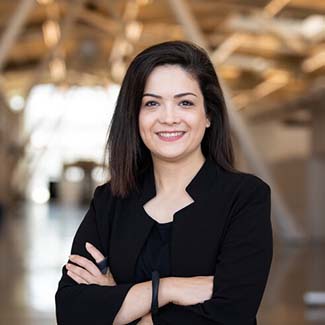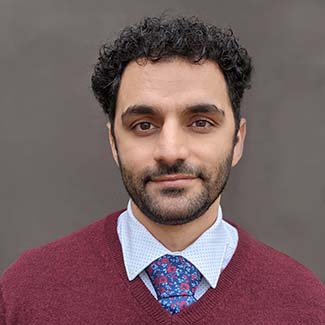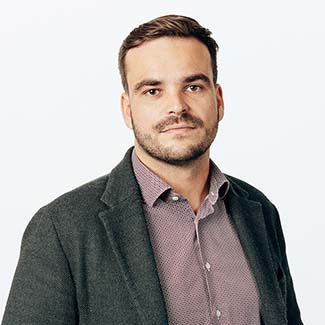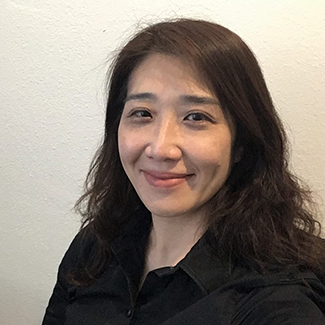Design with Robotics
March 2, 2022 | 2:00–4:30 p.m. | Adam’s Presentation Room, Langford A

Tuning Materials through Computation
Negar Kalantar
Dr. Negar Kalantar, is an associate professor of Architecture and a Co-Director of Digital Craft Lab at California College of the Arts in San Francisco. Her research in Additive Manufacturing, Robotic Construction, Transformable Design, and Advanced Geometries and Materials has been awarded by the National Science Foundation (NSF). By bringing together digital and analog fabrication work-flows across scales, her interdisciplinary research practice broadly investigates how to bridge the recent advancements in additive manufacturing technologies with large-scale structures.

Bio-based Behavioral Robotic Construction
Ehsan Baharlou
Dr. Ehsan Baharlou is an Assistant Professor of Architecture, Advanced Technologies, in the School of Architecture at UVA. His work focuses on integrating design computation and the process of materialization. His research aims to bridge the gap and mediate the cyber-physical interactions between complex forms and advanced manufacturing tools, shifting from a paradigm of abstracted computational design toward an integration of both physical (fabrication and production) and digital investigations.
He completed his postdoctoral associate ’18 at MIT (Massachusetts Institute of Technology) in the Department of Architecture, in Prof. Mark Goulthorpe’s group (Composite Architectures). His post-doctoral research concentrated on the automated production of composite housing and the development of the CAD/CAM software customization in composite architectures. He earned his PhD ’17 under the supervision of Prof. Achim Menges at ICD (Institute for Computational Design and Construction), University of Stuttgart. His doctoral research focused on the integration of fabrication and construction constraints into a computational model for the realization of informed form generation.

Design for Robotic Additive Manufacturing
Mehdi Farahbakhsh
Dr. Mehdi Farahbakhsh is an educator and researcher in the School of Architecture and at the Center for Infrastructure Renewal at Texas A&M University. His study and practice integrate art, technology, philosophy, and human social interactions.
Mehdi holds a Ph.D. in Architecture from Texas A&M University focusing on the robotic-assisted additive manufacturing of scaffold-free shell structures, human-robot collaboration, and digital fabrication technologies. He practiced architecture for eight years and designed more than one million square feet of architectural spaces.

Human-Machine Collaboration
Benjamin Ennemoser
Benjamin Ennemoser is an Assistant Professor of Architecture at Texas A&M University. He studied architecture at the University of Applied Arts in Vienna and the University of Innsbruck where he graduated with distinction. He has received several research fellowships and grants, such as the Tische-Stipendium, the prestigious Dr. Otto Seibert-Stipendien-Schenkung, and the Start-Grant. Previously he has also taught and lectured at UCLA (University California Los Angeles), the University of Innsbruck, the University of Applied Arts in Vienna, the University of Fine Arts in Vienna, Yun-Tech University in Taiwan, and the Tongji University in Shanghai.
His research on computational design, digital fabrication, applied robotics, soft-robotics, VR & AR, artificial intelligence, and interactive architectural systems was published and presented in international journals, conferences, and academic institutions such as the AA London (Architectural Association), Technical University of Berlin, Tongji University, EPFL (École Polytechnique Fédérale de Lausanne) and the NJIT (New Jersey Institute of Technology). He is a licensed architect in the European Union where he founded his own practice, Benjamin Ennemoser Design, in 2016 and most recently collaborated with Google R&D for the Built Environment and Gensler DxD as a technology consultant and design lead.

Making from a desktop: Tools and opportunities in computation
Sora Key
Considering our physical built environment as the largest kind of interface between humans and the surrounding space, Sora is interested in finding ways to computationally represent human spatial experiences produced by the forms that comprise designed ambient environments.
Sora is an assistant professor at Texas A&M University, teaching and programming to research in design method/process and systems to support design. Computation for her is a method and approach to understanding the underlying structure of the rich yet implicit domain knowledge.
Prior to her Ph.D. work, she practiced architectural design in Seattle and Seoul. She has been teaching Design Process/method, Design Foundations, Visual Representation & Spatial Composition, and Introduction to Digital Media, in addition to regular architecture studios. She holds a Ph.D. in Computational Design from Carnegie Mellon University and M.Arch from the University of Washington.
